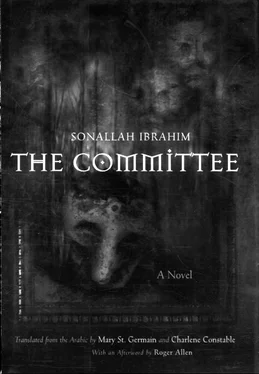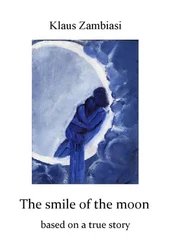I continued questioning him, "How did you come to be secluded here?"
"An article I published."
I looked at him questioningly and he added, "You can easily look it up."
I told him about the difficulties hampering me in my search through the daily paper for news of the Doctor. He interrupted me, "You will certainly find my article, because nobody pays any attention to the newspaper that published it. Besides, I didn't mention him by name."
He gave me the date the article was published and wished me luck. I immediately went to the newspaper. It was an evening daily with limited circulation, which was the reason I hadn't been interested in it at the beginning.
I looked for the article without telling anybody my objective. I stumbled upon it under the provocative title with tragic overtones, "Who Is Removing the Trees?"
Under this title, the writer discussed the disappearance of trees from Cairo's streets and few remaining gardens. Furthermore, he said that from the orderly way they were uprooted, influential persons appeared to be behind it. He asked whether there was a relationship between this phenomenon and the fabricated crisis in the lumber market, which resulted in inflated prices and a black market.
I recorded the contents of the article in my notebook. Then it occurred to me to take the opportunity to proceed in a new direction. I still stuck with this newspaper, but checked specific places: the social calendar, the business section, and the obituaries, at around the same dates I had previously used as a guide.
I hadn't anticipated the amount of information I would come across this way. For example, there was a series of "thank you" telegrams from the Doctor to the president of the country, and another of congratulations to the Doctor from a number of important people. Thus, I learned he had won a seat in Parliament in the general elections.
From a long obituary about some woman related to him by marriage, I discovered an extensive network of relationships linking him to the best-known, richest families and to the individuals holding the top positions in the justice department, the police, the army, the administration, and the world of business and finance.
Advertising, modern man's tool for successful communication, led me to another exciting discovery.
A series of ads caught my eye. They had been published repeatedly on the first page of the paper in recent years, showing French perfume, American cigarettes, and Japanese tape recorders. The advertiser's name was left off, whereas usually in such ads, the name of the importer or "agent" in the Committee's language, the authorized local representative, is mentioned.
The incessant work I had recently undertaken stimulated my mind, as was typical. I began to delve deeply into what came my way, trying to deduce underlying motives and relationships. My curiosity was aroused, so I went over to the paper's advertising department. I pretended to be a reporter from one of the foreign economic journals, preparing an in-depth report on ads published by the Arab media about foreign products.
The upper management of the department was too busy welcoming me to check my credentials, especially after I expressed my admiration for the successful jingles which advertised perfume and filter cigarettes. After all, the masses repeat them in complete obedience. I won their friendship by jokingly asking who among them hadn't yet switched to filters. This way, I easily got the information I wanted.
I wasn't surprised to learn that the Doctor's oldest son by his first wife managed the local firm that imported these products. I had anticipated something of the sort. But I was truly surprised, so much so that I almost burst out laughing, when they showed me the layout of a fullpage ad prepared by that same firm for immediate publication on the last page of all the national papers. The ad promised the Egyptians nothing other than the return of the real Coca-Cola.
I continued visiting the newspaper's premises for some months. The discoveries I made encouraged me to persevere along these lines, especially since no obstacles cropped up.
I came up with a lot of information, several notebooks full. Actually, some of it didn't have any real connection with the Doctor. My interests had gradually and unintentionally expanded to include some general matters. The news items I had previously read now seemed to scroll past my eyes for the first time. It was as though they took on a new significance with the passage of time, which allowed me to see all their diverse interconnections.
At the end of each day, I returned to my apartment exhausted, suffering from dizziness and difficulty in breathing. Dead tired, I would climb the seven floors to my top-floor apartment. After I had bathed and eaten, I dozed a little, then got up to work again. I transferred what I had written down in the morning to index cards provided by a close friend who could not hide his pity. I entered the information under the date the article was published, its source, and the most important subject, in anticipation of sorting the cards to start the second stage of research. I didn't finish until late at night. I slept fitfully, disturbed by unpleasant dreams consisting mostly of newspaper headlines. Once in a while I had a pleasurable dream dominated by images of scantily clad international beauty queens and movie starlets who had caught my attention from time to time.
Preyed upon by depression, I would struggle out of bed in the morning. My imagination multiplied the difficulties I might suffer after reaching the newspaper building and the obscure dangers that surrounded my work. I wouldn't perk up until I had visualized my successes and the remarkable world that had opened up before me.
Actually, a change had come over me in the last months. Formerly I had been bored with everything. My presentation to the Committee and the pursuit of any opportunity that would promote my talents was only an attempt to renew my interest in life. However, the research on the Doctor soon engrossed me, so much so that I began to dread death and prayed that God might avert traffic accidents and heart attacks until I had finished it.
One day when I felt particularly run down, I had to put off leaving. I sat and consulted the index cards I had written out. They were filed in a shoebox to make it easy to retrieve what I wanted.
I found I had a considerable amount of material on my main topics. But I was still ignorant of much of the background of some important points. There was no use in checking the Egyptian or Arabic newspapers, since the political and social situations discourage them from investigative reporting. It occurred to me that foreign magazines might help me, but where could I find collected back issues of even one of them?
The friend who had helped me with the index cards suggested I try the library at the American Embassy. I went to its new location. It had moved there after rioting mobs had burned the old building in 1965. They had been protesting the United States' role in the assassination of Zaire's nationalist leader, Lumumba, and its support of Mubutu, the next leader of Zaire, which was formerly Congo-Kinshasa.
At the library I found scattered issues from betterknown American magazines, such as Time and Newsweek. I leafed through them, concentrating on the pages about the Middle East and disregarding the covers and other parts. Because of this, I didn't notice that one of the issues I held in my hand had a color photograph of the Doctor on its cover. I noticed only afterward, when I found myself trembling with excitement as I read the detailed article about him. It was several pages long and chock full of exciting information.
It was one of last year's issues, covering the wedding of his daughter to an Arab president. This was news to me. Our papers hadn't mentioned it. Apparently, at the time, the marriage had aroused a storm of commentary, not only because of the difference in age, which exceeded thirty years, but primarily for its political and economic implications.
Читать дальше











